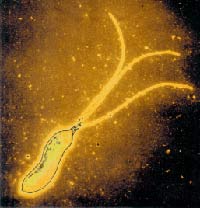People have had stomach ulcers since prehistoric times
According to Nature, the bacteria that cause stomach ulcers " Helicobacter pylori " are present in the digestive system of Homo sapiens since the human race began migrating from Africa about 60,000 years ago. This species of bacteria is present in half of the human population.
 The group of researchers led by Mark Achtman of the Max-Planck Institute for Infectious Diseases (Germany) compared changes between the H. pylori genome and the human gene.
The group of researchers led by Mark Achtman of the Max-Planck Institute for Infectious Diseases (Germany) compared changes between the H. pylori genome and the human gene.
From analyzing 769 bacteria samples collected from volunteers from 51 different ethnic groups around the world, computer simulations have shown that H. pylori may have spread from East Africa about 58,000 years ago. , in accordance with the migration of Homo Sapiens.
Modern people have been infected with this bacterium before migrating from Africa, and since then H. pylori has been living with people.
Thanks to the identification of the bacterium ' Helicobacter pylori ' in 1980, two Australian researchers J. Robin Warren and Barry J. Marshall were awarded the Nobel Prize in Medicine in 2005.
- 6 important things about stomach ulcers everyone needs to know
- New pathogen from peptic ulcer disease
- People with stomach ulcers should eat sweet
- Recognize stomach ulcers
- Stress - The culprit in stomach disease
- The causes of back pain may not be known
- Peppers prevent and treat stomach ulcers
- Helicobacter pylori bacteria may be the culprit causing Parkinson's disease
- Vietnamese people eat and drink together and are susceptible to infection causing stomach cancer
- Unexpected facts about the time of
- 8 reasons to increase oranges
- Create the stomach in the world's first laboratory
 Green tea cleans teeth better than mouthwash?
Green tea cleans teeth better than mouthwash? Death kiss: This is why you should not let anyone kiss your baby's lips
Death kiss: This is why you should not let anyone kiss your baby's lips What is salmonellosis?
What is salmonellosis? Caution should be exercised when using aloe vera through eating and drinking
Caution should be exercised when using aloe vera through eating and drinking